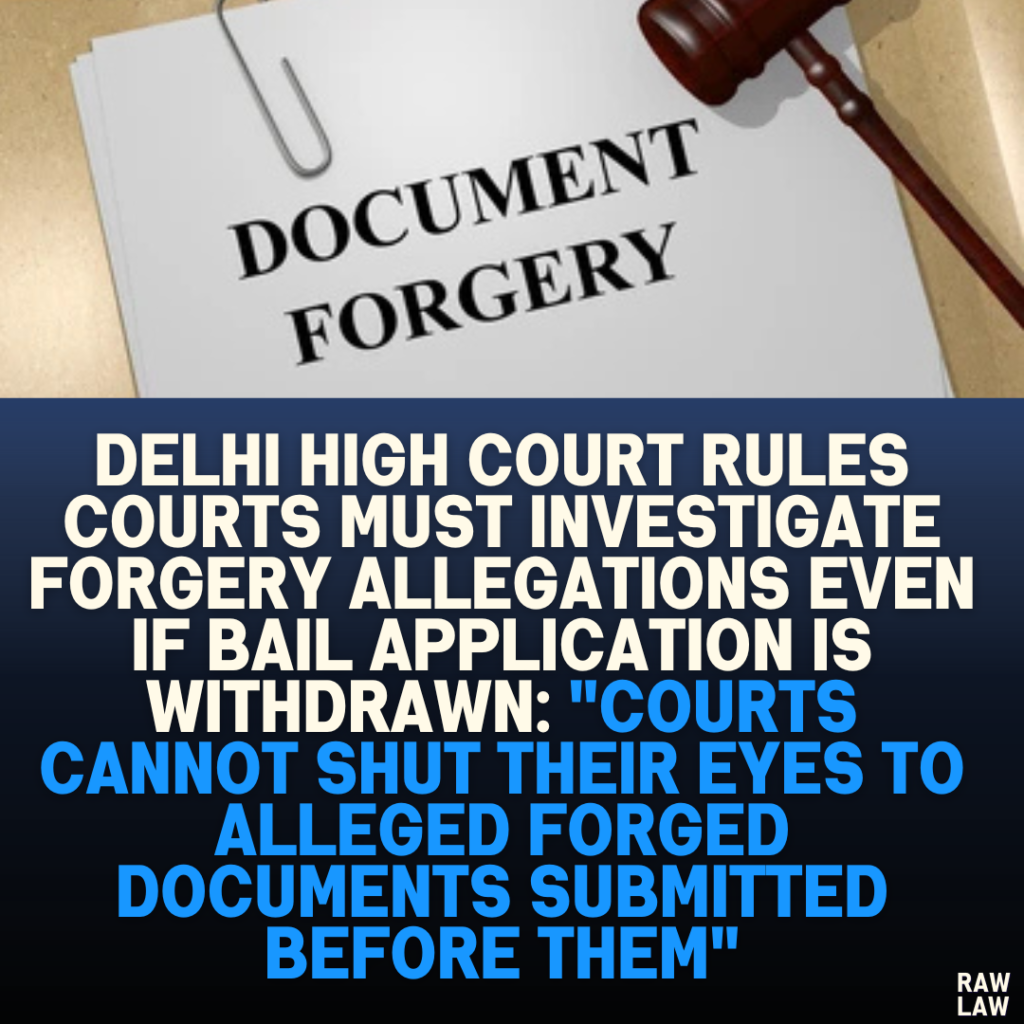Court’s Decision
The Delhi High Court upheld the Trial Court’s order directing an investigation into the alleged forgery of a medical prescription submitted in support of the appellant’s bail application. The court stated that it is imperative for the judiciary to ensure that documents produced before it are genuine. Even though the appellant withdrew his bail application, the court held that withdrawing the application does not preclude the court from addressing allegations of forgery.
Key Point: “If a forged document has been filed before a Court, the Court should not shut its eyes, but direct that a proper investigation be conducted.”
Facts
- Background: The appellant filed for interim bail, claiming his wife required 13 days of rest based on a prescription from a doctor at Guru Teg Bahadur Hospital, Delhi.
- Verification: Upon verification, the authorities found that the doctor had not issued such a prescription.
- Trial Court’s Action: Despite the appellant withdrawing his bail application, the Trial Court ordered an investigation into the alleged forgery, directing the Commissioner of Police to act.
Issues
The court addressed two main legal questions:
- Was the Trial Court justified in ordering an investigation into forgery after the appellant withdrew his bail application?
- Does Section 215 of the Bharatiya Nagarik Suraksha Sanhita, 2023 (BNSS) apply to such allegations of forgery?
Petitioner’s Arguments
- The appellant argued that once the bail application was withdrawn, the Trial Court had no reason to proceed further.
- The appellant also claimed that any inquiry into the alleged forgery should have followed the procedure laid out in Section 215 of the BNSS, which deals with judicial oversight in prosecuting offenses related to documents produced in court.
Respondent’s Arguments
- The State contended that Section 215 of the BNSS was not applicable in this situation since the alleged forgery occurred before the document was submitted to the court.
- They relied on the Supreme Court’s judgment in Iqbal Singh Marwah v. Meenakshi Marwah (2005), which clarified that forgery investigations are permissible when the forgery precedes the document being submitted to court proceedings.
Analysis of the Law
The High Court analyzed:
- Section 215 of BNSS: This provision limits the prosecution of offenses relating to documents submitted to court proceedings. However, it applies only when the offense occurs after the document is in judicial custody (custodia legis).
- The High Court noted that Section 215 does not bar investigations into alleged forgery when the offense occurs before the document is submitted to the court.
Precedent Analysis
The High Court relied on Iqbal Singh Marwah v. Meenakshi Marwah (2005), where the Supreme Court held:
- Section 195 of the CrPC (similar to Section 215 of BNSS) restricts prosecution only for offenses committed after the document is in judicial custody.
- Courts should not ignore allegations of forgery simply because the document was presented in a judicial proceeding.
Applying this precedent, the High Court supported the Trial Court’s directive for an independent investigation.
Court’s Reasoning
The court reasoned:
- Allegations of forgery cannot be ignored, as they undermine judicial proceedings.
- The Trial Court acted within its powers to ensure that the forgery allegations were addressed through an investigation.
- Section 215 of the BNSS was not applicable, as the alleged forgery occurred before the document was submitted in court.
Key Observation: “The learned Trial Court by the Impugned Order has merely directed for an investigation to be conducted and no order adverse to the appellant has been passed as of now.”
Conclusion
The appeal was dismissed. The High Court held that:
- The Trial Court’s direction for an investigation was valid and necessary.
- Further action would depend on the investigation report.
Implications
This judgment highlights:
- The judiciary’s obligation to address allegations of forgery rigorously, ensuring the authenticity of documents submitted in court proceedings.
- The limits of procedural laws like Section 215 of the BNSS, emphasizing that courts retain the authority to order investigations in appropriate cases.
- A broader message that withdrawal of applications does not shield parties from scrutiny when serious allegations, such as forgery, arise.




Pingback: Supreme Court Upholds Eviction of Unauthorized Occupants from Shamlat Deh Lands: Clarifies Leasehold Possession Does Not Equate to Allotment or Ownership Under Punjab Village Common Lands Act, 1961 - Raw Law